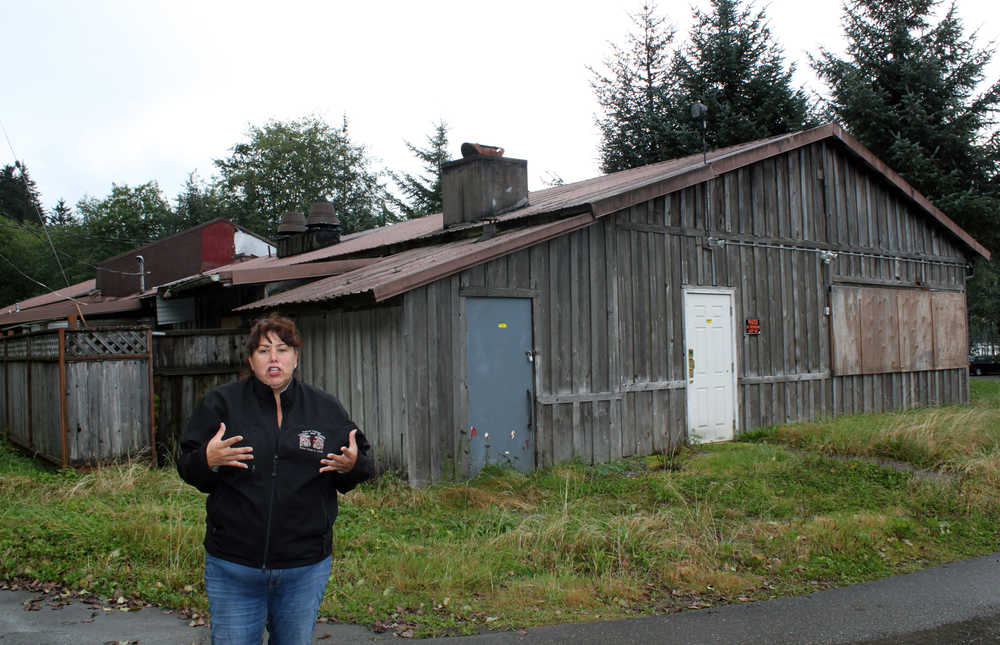Plywood boards cover the windows and doors of the building that used to house the Thane Ore House Salmon Bake. Run-down and weathered by the high winds and rain, ‘no trespass’ signs warn people to keep out.
On a drizzly overcast Saturday, a handful of fishermen drove down a bumpy, gravel road past the building and parked in its empty lot. They walked with their poles to a quiet sandy beach tucked behind the property just a few yards away. A couple more people followed, dragging heavy equipment behind them, to try their luck dredging gold in the channel.
The only other sounds outside were the seagulls overhead.
By next spring, it will be a completely different scene. The shuttered salmon bake, closed a few years ago after the previous owners failed to pay city sales taxes and defaulted on the lease, will be transformed into a cultural immersion park for tourists.
The City and Borough of Juneau awarded the Central Council of Tlingit and Haida Indian Tribes of Alaska a 35-year land lease for the property this week. The federally recognized tribe has big plans for the space.
“We’re creating a cultural activity interactive park,” Myrna Gardner, Central Council’s business and economic development manger, said during a tour of the property Saturday.
“See that old dilapidated building?” she said, pointing to a little, rusty car port in the parking lot. “We’ll get rid of that, and we’re going to put like these long car ports, in this corner, and then another one in this corner, and another one over here.”
Under one shelter, a master carver and five young apprentices will carve 30-foot long traditional Tlingit canoes. Under the second, another carver and a group of youth will carve canoe paddles. The third corner will have a weaver showing children how to weave traditional Haida baskets. Perhaps a fourth will feature an elder demonstrating how to harvest and make salve out of the prickly devil’s club plant.
“Our plan is to not only teach our children, but we’re going to share with our guests that come to visit us that we’re a living culture,” Gardner said. “We’re not a textbook. It’s not like those Tlingits who once lived — we are, and we’re active, and we exist every day.”
Cultural immersion
The overall goal of the venture, Gardner said, is to teach tourists about the Tlingit and Haida cultures and also to create job opportunities for tribal members.
Gardner estimates it will create about 200 jobs, ranging from landscaping and restoration jobs once the renovations begins to actual employment at the center once it’s complete.
“It’s going to be very busy here,” she said.
The tribe plans on bringing tourists to the site, located four miles south of downtown Juneau on Thane Road, by bus.
Outside, employees will speak in Tlingit and guide guests around to the various set-ups, showcasing the work of the carvers and apprentices.
Inside, there will be a restaurant that serves traditional food, such as salmon, blueberry and salmonberry desserts and tea. Conveniently, the building is already set up for that, although the interior is a mess right now.
“We’re contracting with people to come in and clean it out,” she said.
A stage inside will feature Native Alaskan dance group performances. A retail gift shop will be set up in one of the rooms and will sell Native artwork from carvings to masks to sea otter wear.
“We’re also planning to have a weekly resident artist, so some days you’ll be able to come in and see someone like Doug Chilton, whose a renown silver carver, work on his bracelets. You’ll come in and see maybe Nathan Jackson working on his head masks,” Gardner said.
The building itself, erected in 1982, will be restored into a traditional Tlingit longhouse, complete with corner house posts of an Eagle and Raven to represent two moieties of the Tlingit people.
It’s not yet known if the existing structure will be torn down, or if a new facade and siding will be built and placed over it. Gardner said that will be up to the engineers.
Gardner said the site will be somewhat similar to other cultural destinations in Southeast, such as Icy Strait Point in Hoonah and the Whale House in Kassan.
“Here in Juneau, there wasn’t really a place where you could experience that,” Gardner said. “Out here, you’re going to hear the eagles sing, you’ll hear the ravens call. So what a beautiful experience if you’re a guest and you’re walking around here, and you’re meeting some of our people, and they’re sharing their knowledge with you, and you get to experience that.”
Not just a summer enterprise
Central Council plans on keeping the building open all year long, not just during the summer months when the tourists are in town.
“We’re not going to be like the other businesses — last ship leaves, they shut their lights off,” Gardner said. “We’re into keeping active here and keep doing what we do best, which is our language and our culture, and teaching it.”
In the off-season, Gardner imagines there will be opportunities for artist workshops, dance lessons, potlatches and other community events.
Once the longhouse is built, Gardner said she imagines it will be a lovely place for a wedding and reception.
“Because we’re a federally recognized tribe and we have our own tribal court, we actually are chartered to perform marriages,” she added.
“It’s really about the respect for our culture, and sharing it,” Gardner said about the future park. “We’re very proud people, and we believe it’s our responsibility to share our knowledge, not only with our children, but the people we live with. It makes a stronger community.”

